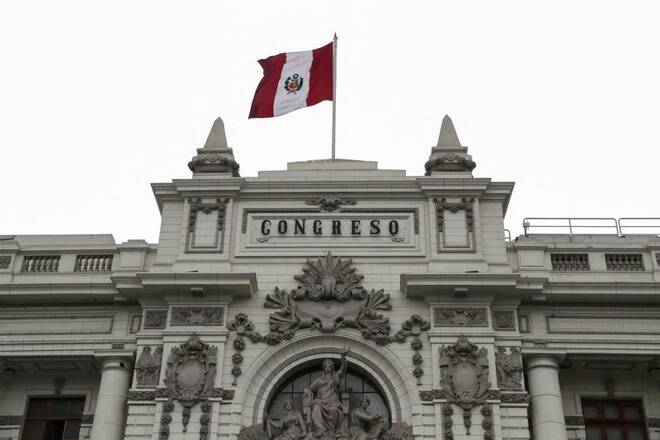Advertisement
Advertisement
Why are Peruvian politics such a mess? Inside the halls of its Congress
By:
By Alexander Villegas and Brendan O'Boyle
By Alexander Villegas and Brendan O’Boyle
LIMA (Reuters) – As deadly protests rage across Peru, a political battle is unfolding inside the halls of Congress, walled off from the streets by hundreds of police, armored vehicles and a maze of gates.
Lawmakers are at loggerheads over whether to hold a snap election this year following the Dec. 7 ouster of leftist President Pedro Castillo part-way through his term, an event that sparked weeks of protests that have seen 48 people killed.
Despite the violence, and despite polls that show the majority of Peruvians want the election brought forward, Congress appears to be in deadlock. At least three election bills have been rejected and others knocked back before being debated in the past week, with parties on the left and right apparently unable or unwilling to compromise.
“They fight like they’re in a street market,” said Juliana Gamonal, 56, a food delivery person in Lima. “We don’t have good leaders right now, everything is for their benefit, not for the people.”
Reuters spent the last week inside the 130-seat Congress in capital Lima, talking to lawmakers to ask why Peruvian politics seems to be in such a mess. Tensions between lawmakers were high, often boiling over into shouting matches.
A number of issues underpin the dysfunction.
Primarily, the Congress is unusually fragmented. It has 13 different voting blocs, caused in part by rules that allow a group of five lawmakers to easily create a new one. The two largest parties have just 24 and 15 seats respectively, making it hard to reach majorities needed for legislation.
“When there’s a greater number of factions, that doesn’t help when you have to discuss and reach agreements,” said Paul Gutierrez, congressman for the Magisterial bloc, a group of 10 legislators that broke off from far-left Peru Libre.
As mainstream political factions have weakened, disillusioned voters have turned to fringe parties – including a religious sect and Peru Libre – exacerbating the division.
Meanwhile, constitutional rules make it relatively easy to attempt impeachment – leading the fragmented blocs to use it to punish presidents they don’t like, something that has happened regularly in recent years.
Castillo was ousted in an impeachment trial in December that he sought to avoid by illegally dissolving Congress and ruling by decree, a failed move that led to his arrest on charges of “rebellion.”
It was the third attempt at the impeachment of Castillo since he took power in July 2021, and the seventh impeachment attempt in the last five years – which have seen six presidents.
Tania Estefany Ramirez, a congresswoman for main right-wing party Popular Force, was unapologetic, saying that safeguarding Peru from overspending and corruption was their priority.
“Regretfully we’ll always be the bad guys of the movie because we’re going to have our eyes on every sol, on every ministry that moves in our country,” she said.
But the political stalemates and street violence have weakened governance, hurt the economy, and put copper supply at risk in the world’s no. 2 supplier of the metal.
Disillusionment among voters has risen, and parliament now has an approval rating of just 7%. Angry protesters have demanded a Congress clear-out and snap elections.
To try to resolve the deadlock and appease the protesters, new President Dina Boluarte, who was Castillo’s deputy, has called for swift elections, urging Congress to move quickly.
Popular Force has put forward a bill, as has Peru Libre. But both were rejected, with some lawmakers reluctant to support the opposition and with disagreement as to whether the bill should include a referendum for a new constitution.
Flavio Cruz, a congressman for Peru Libre, blamed the right for “taking over” the state, but admitted Congress had failed the people by not reaching agreement.
“We have dysfunction of parliament, which should have kept harmony, unity, dialogue, agreement and consensus,” he said. “We have never had understanding between us. That is what the population is punishing. Our inability to agree.”
Days of closed-door talks have appeared to make little progress, with cliques holding their ground over red-line policies.
An exasperated Boluarte introduced her own bill, which called for elections in October and a new president taking office on Dec. 31. A congressional commission took up the bill Friday afternoon but shelved it on a technicality before it even reached debate.
Even if a deal is finally reached, a reset of Peru’s troubled political system is unlikely, analysts said.
“There is little agreement within political parties as to what to do,” said Peruvian political analyst Andrea Moncada.
“If we have elections in a year or by some miracle by the end of this year, the parties registered to participate are the same ones that are in Congress right now.”
(Reporting by Alexander Villegas and Brendan O’Boyle; Editing by Adam Jourdan and Rosalba O’Brien)
About the Author
Reuterscontributor
Reuters, the news and media division of Thomson Reuters, is the world’s largest international multimedia news provider reaching more than one billion people every day. Reuters provides trusted business, financial, national, and international news to professionals via Thomson Reuters desktops, the world's media organizations, and directly to consumers at Reuters.com and via Reuters TV. Learn more about Thomson Reuters products:
Advertisement
